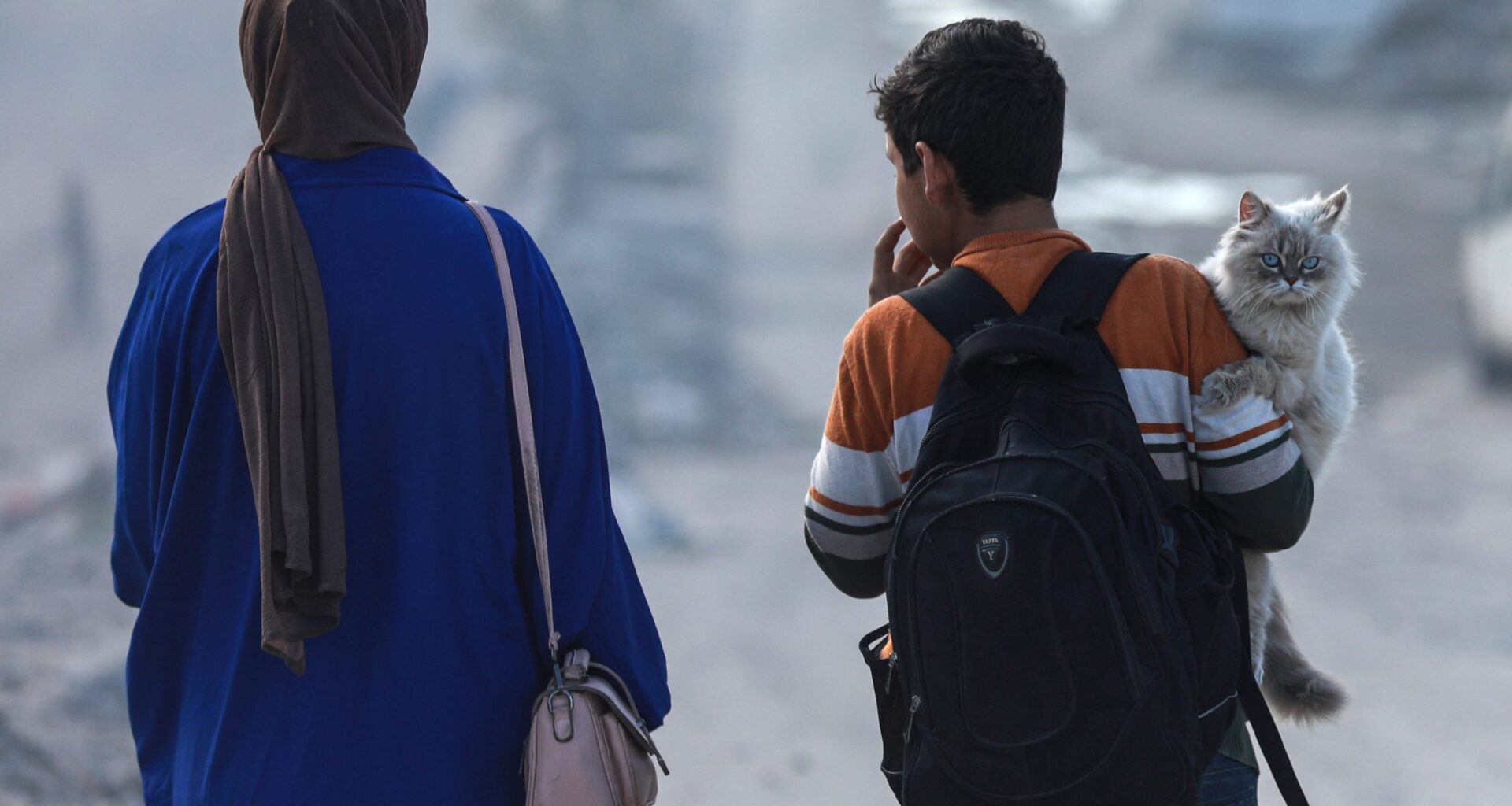This story contains a graphic image of an animal that may disturb some readers.
When I asked my 23-year-old brother, Mohannad, what is the one thing he cannot live without, he answered without hesitation: animals and raising animals.
Then the war collapsed our world. Bombardments thundered overhead, evacuation orders forced us to flee, and starvation crept into every home. The genocide has robbed us of everything, but it cannot take our love and devotion for animals.
For us, this love is not something we learned or acquired. It is something that runs deep in our family, passed down like a legacy—from our grandparents, to our parents, to us, and now to our children. It is more than habit or work; it is the way we know how to live, the way we understand love, and the way we mourn.
My grandmother, Hamida, experienced the first Nakba. She was expelled from Pershebia with her mother and brothers on horseback. Whenever she told us the story, she spoke of the loyalty of those horses, how they carried her family when everything else was lost. She told us that when her brother died young, his horse neighed endlessly, as though it knew its companion was gone forever. Later, she raised pigeons, chickens, sheep, and goats. Each morning before touching her own breakfast, she fed her animals first. She told us often that animals are souls that can feel us; they are no less than us. They fear, they rejoice, they comfort, and they trust the people who care for them.
For her, animals were not separate from us; they were part of the family, part of what kept life bearable after everything had been taken.
My father carried on the tradition. He raised flocks of sheep, each one given a name, many after us children. The youngest lambs were called Mohanned and Hend.
Our older brother, Ahmed, revived horsemanship in our community and became a true knight, competing in and winning contests. We built a stable for three purebred Arabian horses, each one a source of pride. When Ahmed died in a car accident, the horses cried for him. They neighed as though mourning their master, their friend, their rider. The grief was unbearable. In the end, they were sold, because they could not live in a stable of loss. Their departure was another wound layered on top of Ahmed’s death, one that left the whole family hollow.
Mahmoud, younger than Ahmed, raised everything: horses, dogs, sheep, cows, cats, pigeons, and birds. Each of them with a story, each of them holding a special place in our family.
During the long history of oppression and occupation, we’re not the only ones suffering. The animals of Gaza have also suffered blockade, poverty, and lack of necessary medications. This latest ongoing genocide has only deepened the crisis, making survival an elusive fate for animals and humans.
Before the genocide, we had a horse named Haris and a German shepherd named Liza. But as securing food for ourselves became impossible, securing feed for the animals was even harder. As the famine worsened, people in Gaza with nothing to eat sometimes were forced to experiment, creating “antibiotic ice cream” for children or combining animal feed with lentils to provide their families with some form of sustenance. Still, even as we went hungry, we tried our best to keep our animals fed. We stored Liza’s food and Haris’ feed alongside our own. My brothers placed zinc sheets over the animal shelters, desperate to shield them from shrapnel. But in Gaza, there is no such thing as safety—not even for animals.
We have seen pigeons fall from the sky, shot down by drones. My nephews and nieces cried over them as if they had lost loved ones. We suffer the same conditions as our animal companions. I have lost count of how many times I’ve survived the bullets from quadcopters—not including missiles and airstrikes.
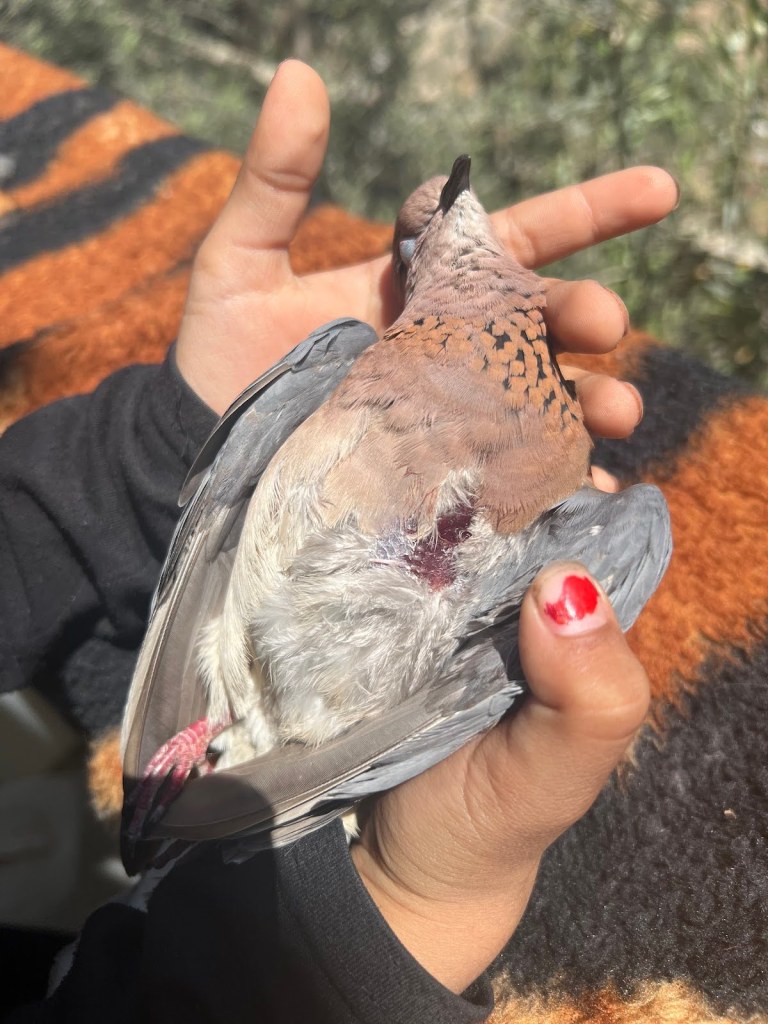 During the genocide, even the death of a pigeon weighed heavy on the hearts of writer Hend Salama Abo Helow’s nieces and nephews. Credit: Hend Salama Abo Helow
During the genocide, even the death of a pigeon weighed heavy on the hearts of writer Hend Salama Abo Helow’s nieces and nephews. Credit: Hend Salama Abo Helow
In January 2024, when orders to evacuate came yet again, we prepared to flee with our animals to the so-called safe zone in Deir al-Balah. But bombs fell, striking our house. My grandmother, Aida, was killed. My 11-year-old nephew, Ahmed, tried to gather his chickens, only to see them torn apart by shrapnel before his eyes. He could not fully grasp death, martyrdom, or genocide. He only understood that everything around him felt like death and destruction, yet somehow he remained alive.
Even in our grief, we refused to leave our animals behind.
Mohanned had a canary, Hudhud. On the morning of the evacuation, he released him into the sky.
“I don’t know if we will survive or die, so I let him go. Maybe he will live,” he said, sadly. For Mohanned, the risk of the bird dying in the wild was preferable to forcing the bird into the hunger and uncertainty we were marching toward.
Our family had no idea where we were going—whether to a house, a tent, a school, or a shelter. And when we settled into wherever we were forced to go, what if the other displaced people didn’t feel comfortable having animals around? For our family, this question carried as much existential weight as the question of where to go.
Survival means union
Over time, my family scattered to different places—some to Rafah, some to al-Zawaida camp, some to Deir al-Balah. Liza stayed with a friend, but she fled back to our destroyed home. Alone, she waited to see one of our faces.
One day, Mahmoud risked his life to return. The moment Liza saw him, she ran to him and barked with joy. He brought her back to our family, and we swore to her we’d never part with her again.
After a month, we returned to our half-demolished home with Haris and Liza. Back then, it was a ghost town, with only stray dogs and cats roaming around, starved and terrified. Mohannad, who graduated in May 2025 with a degree in animal production, a field focused on the day-to-day care of livestock, could not ignore the animals he encountered in the streets. And the animals followed him, sensing his kindness.
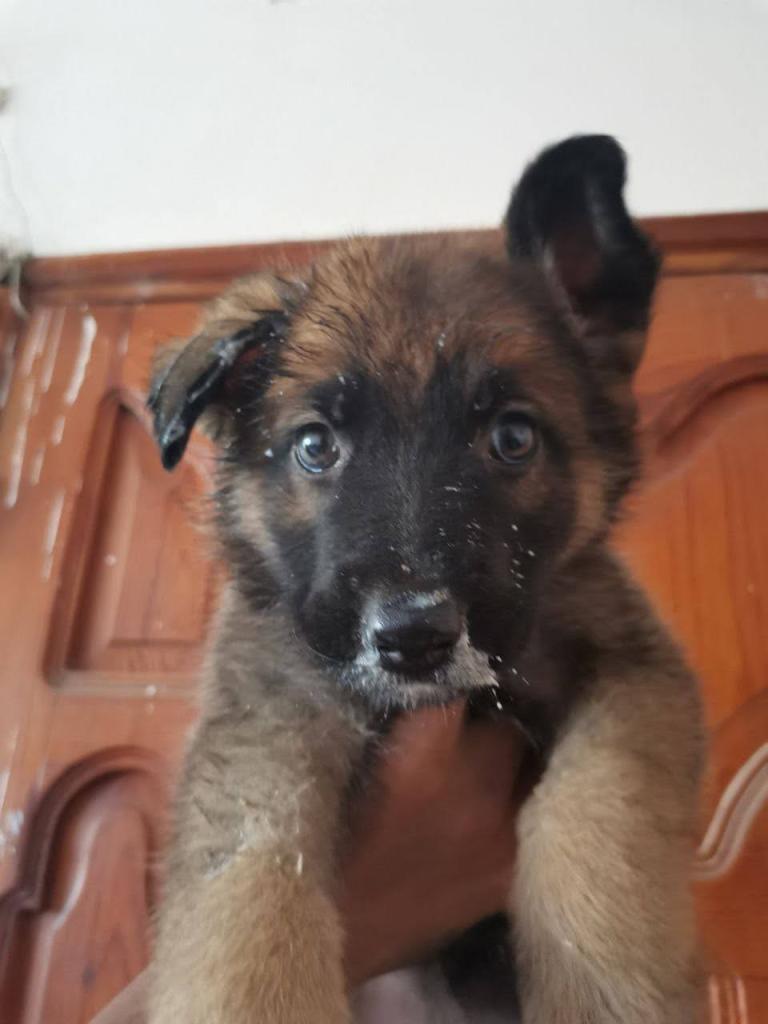 The puppy cared for by writer Hend Salama Abo Helow’s brother, Mohanned. The animal was given baby formula to survive. Credit: Hend Salama Abo Helow
The puppy cared for by writer Hend Salama Abo Helow’s brother, Mohanned. The animal was given baby formula to survive. Credit: Hend Salama Abo Helow
One puppy in particular clung to him. Mohannad fed the puppy baby formula meant for my nephew, Jawad. The 2-year-old cried himself to sleep, convinced the puppy had taken his milk.
My nieces later discovered three kittens trembling under an olive tree, their mother killed searching for food. My nieces became caregivers, wrapping the kittens in blankets, feeding them, and rocking them like infants.
This is not the only time we’ve taken on more animals during the genocide, even as we struggled to feed and care for ourselves. For example, we also adopted a dog named Boshkur, whose owner could no longer feed him. My nephew spent his meager savings to buy cans of food for the dog, prioritizing Boshkur’s survival over his own. One night under bombardment, I heard Boshkur barking as if in pain. At 2 a.m., under drones that shot at anything that moved, I ran to the scared dog and carried him home.
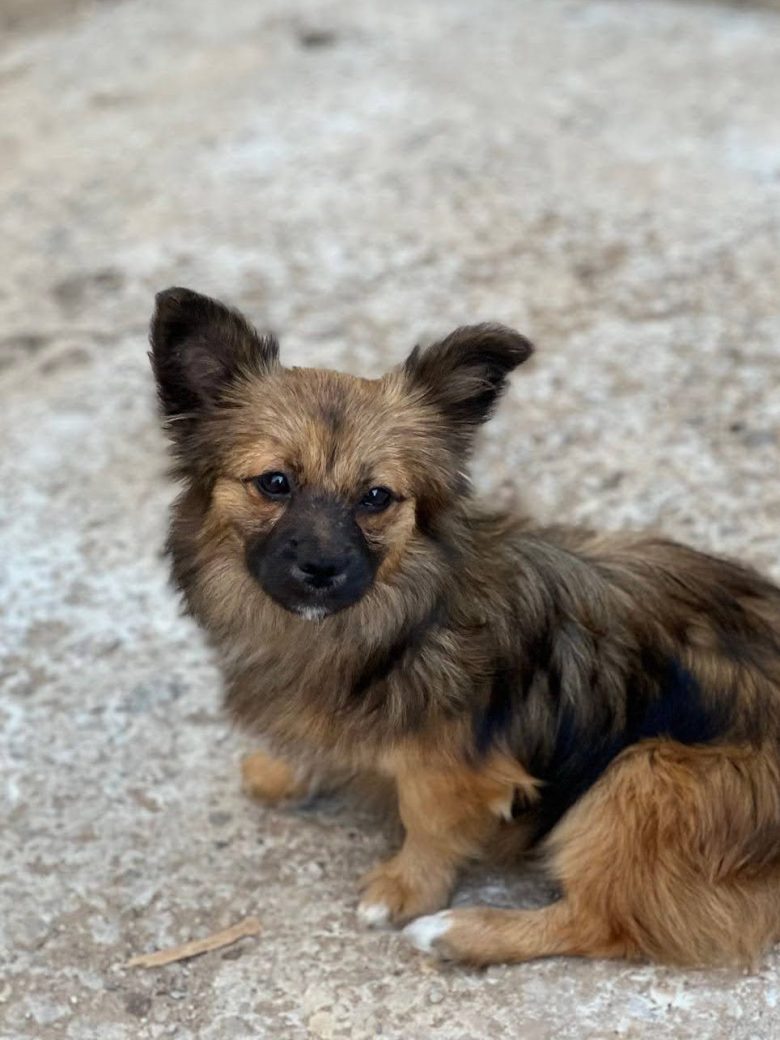 Boshkur, the dog that writer Hend Salama Abo Helow’s family has adopted during the genocide. Credit: Hend Salama Abo Helow
Boshkur, the dog that writer Hend Salama Abo Helow’s family has adopted during the genocide. Credit: Hend Salama Abo Helow
During the genocide, our spoiled horse has lived better than most. We would rather walk miles than ride him and exhaust him. Horses must eat to stay energized, and they cannot eat just anything. While food prices have soared, at the same time, no animal feed has entered Gaza for months.
Like us, animals have been displaced, starved, bombed, and terrorized. After each airstrike, we rush to check on Haris the same way we rush to check on each other. He, too, froze in terror.
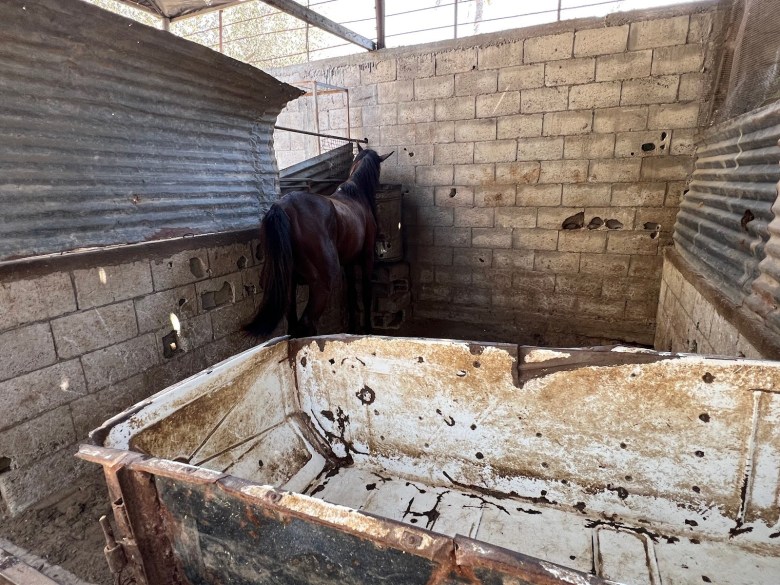 During the genocide, the horse Haris that belongs to the family of writer Hend Salama Abo Helow searches anxiously for food. Credit: Hend Salama Abo Helow.
During the genocide, the horse Haris that belongs to the family of writer Hend Salama Abo Helow searches anxiously for food. Credit: Hend Salama Abo Helow.
Famine has reduced us all—humans and animals—to bones and skeletons. Our ribs stick out. We spend our days hungry, but still we find it in ourselves to share. How many times have I shared my tiny portion of bread with the animals? At mealtime, I have seen pigeons, cats, ducks, hens, dogs, and humans gather around the same dish. In Gaza, survival means union—even across species.
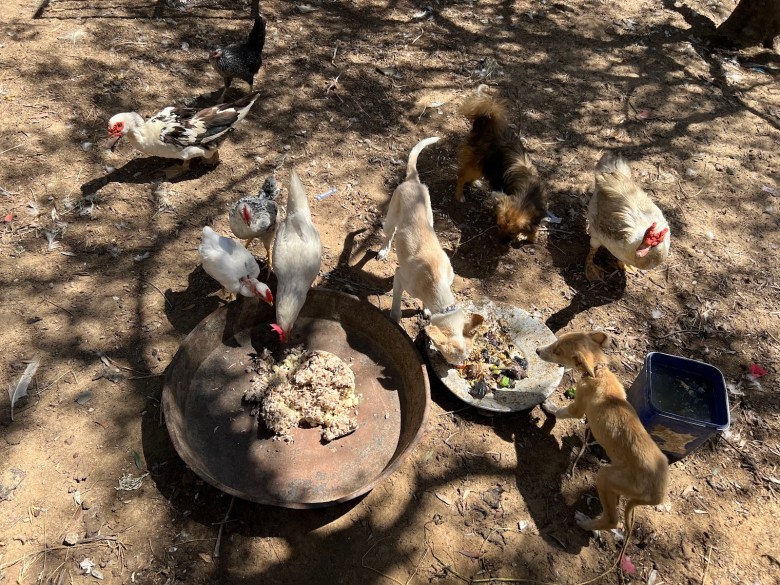 In Gaza, a variety of animals come together for a meal, lovingly gathered by families who can barely feed themselves. Credit: Hend Salama Abo Helow
In Gaza, a variety of animals come together for a meal, lovingly gathered by families who can barely feed themselves. Credit: Hend Salama Abo Helow
I could not help but bitterly laugh when, in August, Israel boasted of its plan to “rescue” donkeys from Gaza, alleging the animals lived a life of “slavery.” Donkeys are lifelines in Gaza, especially when the fuel ran out. Still, I saw Mohannad buy a donkey on the verge of death, spending $200 on medicine to save the animal. It lived, but only for a short while. As recently as last month, Mohannad rescued a donkey that had been crushed by trucks carrying displaced people to the south. He found it one night, bleeding by the side of the road and groaning in pain. Together, we helped heal the animal’s wounds. Mohannad never regrets these costly decisions. He tells me often that the animals also have souls, just like us.
I still believe Israel’s donkey-saving mission was a thinly veiled attempt to make transportation even more difficult in Gaza. But beyond that, what about the donkeys’ owners, the Palestinian people Israel kills and maims in the thousands, the people now dying of famine and denied health care? While Gazans sacrifice their safety, comfort, and sustenance to care for their beloved animals, Israel cannot see us as human.
I can still remember hearing Israeli Defense Minister Yoav Gallant describe us as “human animals.” The phrase was meant to strip Palestinians of our dignity.
But it failed.
Neither we nor our animals should endure this cruelty. And yet, even under genocide, we carry our animals with us. We keep them alive, just as they keep us alive. What Israel’s leaders cannot understand is this: Our bond with animals is the deepest proof of our humanity. We are bombed together, starved together, displaced together. Yet we do not abandon one another. Our love for them, their love for us, is humanity in its purest form.
Editorial Team:
Tina Vasquez, Lead Editor
Carolyn Copeland, Top Editor
Stephanie Harris, Copy Editor
Related

